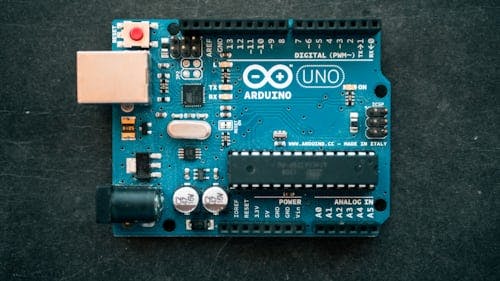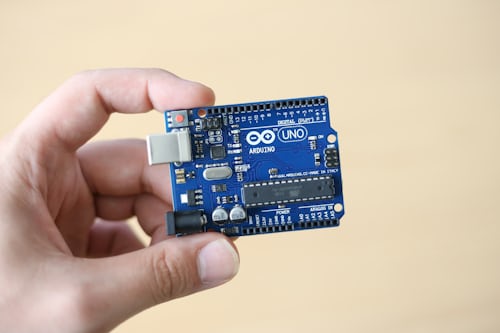
# Introduction to Arduino
Arduino is an open-source electronics platform based on easy-to-use hardware and software. It is designed to make the process of creating interactive projects more accessible for artists, designers, hobbyists, and anyone interested in creating interactive objects or environments.
## What is Arduino?
Arduino consists of two main components:
1. **Arduino Board**: This is a small microcontroller board that can be programmed to perform various tasks. The board contains a microprocessor, input/output pins, and other components that allow it to interact with the physical world.
2. **Arduino IDE (Integrated Development Environment)**: This is a software application used to write, upload, and debug code for the Arduino board. The IDE is based on a simplified version of C/C++ programming language, making it relatively easy to learn for beginners.
## Getting Started with Arduino
To get started with Arduino, you'll need the following:
- An Arduino board (e.g., Arduino Uno, Arduino Nano, Arduino Mega, etc.)
- A USB cable to connect the Arduino board to your computer
- The Arduino IDE software (downloadable from the official Arduino website: [arduino.cc](https://www.arduino.cc/))
Once you have all the necessary components, follow these steps:
1. Install the Arduino IDE on your computer.
2. Connect the Arduino board to your computer using the USB cable.
3. Open the Arduino IDE and select the appropriate board type and port from the respective menus.
4. Write your code or open an example sketch from the IDE.
5. Upload the code to the Arduino board by clicking the "Upload" button.
Here's a simple example of an Arduino sketch that blinks an LED:
```arduino
// Define the LED pin
int ledPin = 13;
void setup() {
// Set the LED pin as an output
pinMode(ledPin, OUTPUT);
}
void loop() {
// Turn the LED on
digitalWrite(ledPin, HIGH);
delay(1000); // Wait for 1 second
// Turn the LED off
digitalWrite(ledPin, LOW);
delay(1000); // Wait for 1 second
}
```
In this example, we first define the pin number for the LED (13 for most Arduino boards). In the *setup()* function, we set the LED pin as an output using the *pinMode()* function. The *loop()* function is the main part of the program that runs continuously. Here, we turn the LED on by setting the pin to *HIGH*, wait for a second using the *delay()* function, then turn the LED off by setting the pin to *LOW*, and wait for another second.
## Arduino Boards and Shields
Arduino offers a wide range of boards and shields (add-on circuits) to cater to different project needs. Here are some popular Arduino boards:
- **Arduino Uno**: The most popular and widely used Arduino board, suitable for beginners.
- **Arduino Nano**: A compact board, ideal for projects with space constraints.
- **Arduino Mega**: A larger board with more memory and I/O pins, suitable for more complex projects.
- **Arduino Due**: A board based on a 32-bit ARM core microcontroller, offering more processing power.
Arduino shields are add-on circuits that can be stacked on top of an Arduino board to provide additional functionality, such as wireless communication, motor control, or sensor integration.

## Applications of Arduino
Arduino can be used for a wide range of projects and applications, including:
- Home automation
- Robotics
- Environmental monitoring
- Internet of Things (IoT) projects
- Interactive art installations
- Educational projects and workshops
With its versatility and ease of use, Arduino has become a popular choice for makers, hobbyists, and professionals alike, enabling them to bring their ideas to life through interactive and innovative projects.
## Learning Resources
If you're new to Arduino, there are plenty of resources available to help you learn and explore further:
- Official Arduino website: [arduino.cc](https://www.arduino.cc/)
- Arduino Tutorials: **[arduino.cc/en/Tutorial/HomePage](https://www.arduino.cc/en/Tutorial/HomePage)**
- Arduino Project Hub: **[create.arduino.cc/projecthub](https://create.arduino.cc/projecthub)**
- Arduino Forums: **[forum.arduino.cc](https://forum.arduino.cc/)**
- Books and online courses on Arduino programming and electronics
Whether you're a beginner or an experienced maker, Arduino offers a fun and engaging way to bring your ideas to life through interactive electronics projects.
.jpg&w=128&q=75)